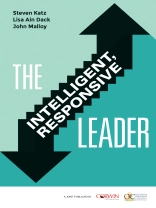Jump start your roles as ‘learning leader’ and ‘lead learner!’
Designed for leaders to learn and lead within the ‘middle space’ between the seemingly opposing dynamics of district expectations and practitioner experience, this book advances the concept of the school as a learning organization. This innovative perspective guides leaders through an intentional, deliberate learning process to develop intelligent, responsive leadership practice. Using stories, strategies, and tools, the authors
- Explain the power of ‘purposeful practice’ as a methodology for getting better
- Show how to build the requisite capacities to lead effectively via ‘influence’
- Describe how to turn adaptive challenges into leadership inquiries for growth
‘This important work demonstrates and reinforces the idea that continuous improvement can only come from deep, intentional, focused, and hard work on the part of everyone within an organization. While the examples are rooted within schools and school districts, this work is applicable to any organization that seeks meaningful and specific improvement in their results. This is a must-read for leaders!’
—Lynn Macan
University at Albany – SUNY, Albany, NY
Daftar Isi
Preface
The Rationale
The Focus
Organization
Reading and Using This Book
Acknowledgments
Publisher’s Acknowledgments
About the Authors
Chapter 1: The Challenge of Leading in the Middle Space
Beyond Intentional Interruption
The Centrality of Professional Learning
Leading in the Middle Space
Implementation Challenges at the Nexus of Pressures and Supports
Initiativitis and Literal Leadership
Polemics in the Middle Space
Time for Reflection
Chapter 2: The Intelligent, Responsive School
The Power of And
Prescription and Professional Judgment
Intelligent Expectations
Responsive Conditions
The Relationship Between Intelligent and Responsive
Beyond Polemics
Time for Reflection
Chapter 3: Intelligent, Responsive Leadership Practice
Leadership, Professional Learning, and Classroom Practice
Intelligent Leadership Practices
Leading an Intelligent, Responsive School
Time for Reflection
Chapter 4: The Psychological Foundations of “Getting Better”
The Psychological Foundations of Leadership Learning Inquiries
The Psychological Foundations of Collaborative Leader Learning
Time for Reflection
Chapter 5: Getting Better at “Influence” Through Leader Learning Inquiries
What Are Leader Learning Teams?
Leadership Learning Inquiries
Developing a Leadership Inquiry Question Using Our Leadership Inquiry Template
The “How” of a Leadership Inquiry
Why Sticking With the Template Matters
Knowing When a Leadership Inquiry Is “Done”
Moving Forward
Time for Reflection
Chapter 6: Ensuring That Together Is Better
The Mechanics of the Leader Learning Team
The Ongoing Spirit of Critical Friendship
Our Learning Conversations Protocol: An Intentional Interruption Strategy for Enhanced Collaborative Learning
Toward a Preferred Future of the Intelligent, Responsive School
Time for Reflection
References
Index
Tentang Penulis
John Malloy is the Director of Education for the Toronto District School Board. He has an Ed.D. in educational administration from the University of Toronto (OISE, UT). Prior to being the Director of Education in Toronto, John held senior leadership positions at the Ontario Ministry of Education and in three other Ontario school boards. John′s areas of expertise include leadership development, large scale system change, strategic planning, professional learning, and equity. John has fostered a culture of collaborative inquiry and shared leadership in each of the school districts where he has led, which in turn has produced improved outcomes for students.












